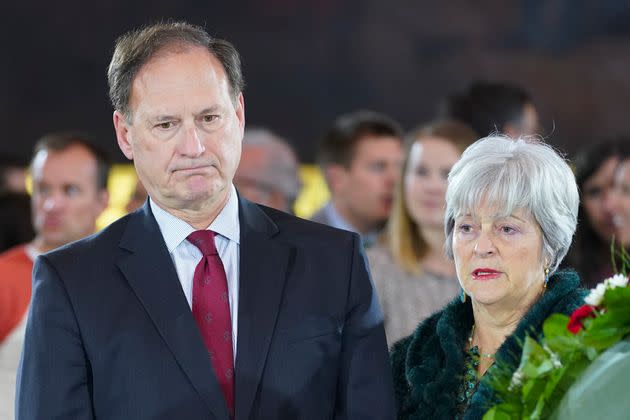Alito Says One Side Of Political Fight Is ‘Going To Win,’ Private Event Recordings Reveal
U.S. Supreme Court Justice Samuel Alito said the political rift between the left and the right would be extremely difficult to repair and that one side was “going to win,” according to secretly recorded comments at a private event earlier this month.
Lauren Windsor, who describes herself as a documentarian and journalist, shared recordings of two encounters with Alito and Chief Justice John Roberts at an annual event held by the Supreme Court Historical Society on June 3. She said she posed as a religious conservative and held discussions with both men.
At one point, Windsor told Alito she didn’t believe conservatives could “negotiate with the left in the way that needs to happen for polarization to end.”
“I think you’re probably right,” Alito replied in the recorded conversation. “One side or the other is going to win. I don’t know. I mean, there can be a way of working, a way of living together peacefully, but it’s difficult, you know, because there are differences on fundamental things that really can’t be compromised. They really can’t be compromised.”
Windsor went on to say that people who “believe in God have got to keep fighting … to return our country to a place of godliness.”
“I agree with you,” Alito said. “I agree with you.”

The recordings were released as the court faces new ethics questions raised by reports that two flags affiliated with the Jan. 6, 2021, insurrectionists were flown outside Alito’s homes in recent years. The justice has refused calls to recuse himself from cases before the court related to the attack on the U.S. Capitol by supporters of Donald Trump and to the former president’s claims of absolute immunity from prosecution for his actions while in office.
Windsor’s conversations with Roberts were far more confrontational. As Windsor attempted to tell the chief justice the nation needs to be put on a more “moral path,” Roberts pushed back.
“Would you want me to be in charge of putting the nation on a more moral path?” he asked. “That’s for people we elect. That’s not for lawyers.”
When Windsor again tried to say that America is a “Christian nation,” Roberts took umbrage.
“I don’t know that we live in a Christian nation,” he said. “I know a lot of Jewish and Muslim friends who would say maybe not, and it’s not our job to do that.”
The chief justice went on to say the court’s role in trying times is “nothing new,” pointing to the fractured political landscape after the Vietnam War.
Windsor belongs to the society and bought a ticket to the event using her real name, but she did not identify herself as a journalist or tell the justices she was recording them. She told The New York Times that she thought keeping the recording secret was the only way to get the justices to share their honest thoughts and provide proof, “otherwise, it’s just my word against theirs.”
“We have a court that has refused to submit to any accountability whatsoever — they are shrouded in secrecy” she told the Times on Monday. “I don’t know how, other than going undercover, I would have been able to get answers to these questions.”
The nonprofit society is billed as a nonpartisan group focused on preserving and collecting the history of the Supreme Court and raising public awareness about its work.
However, the body, whose honorary chair is Justice Roberts and which counts Harlan Crow, Justice Clarence Thomas’ controversial benefactor, among its board of trustees, has faced controversy in the past few years.
The New York Times in 2022 reported that it had become a conduit of influence-peddling by “corporations, special interest groups, or lawyers and firms that argued cases before the court,” accounting for 60% of its contributions since 2003.

